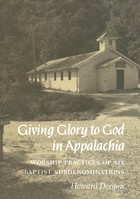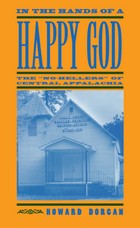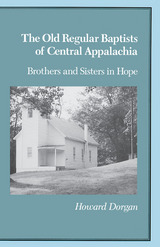3 books about Dorgan, Howard

Giving Glory To God Appalachia
Worship Practices Six Baptist Subdenominations
Howard Dorgan
University of Tennessee Press, 1987
In Giving Glory to God in Appalachia, Howard Dorgan explores the worship practices of Primitive, Regular, Old Regular, Union, Missionary, and Free Will Baptists. The worship practices of the denominations under consideration are varied and often exuberant, and Dorgan's writing is highly evocative, conveying in rich detail the joy and pathos of worship in these mountain churches.
As Dorgan states in the introduction, he is less concerned with academic theorizing and more concerned with presenting a vivid, first-hand account of all that he has seen and heard. And in the nearly fifteen years he spent researching his book, Dorgan saw quite a lot: spirited, vociferous sermons, creek baptisms, foot washings, home comings, dinners on the ground, and evangelistic radio broadcasts. Dorgan's prose is at its most enchaining when he presents tableaus of these phenomena: a foot washing precipitates the erasure of interpersonal turmoil between two women; a preacher uses his lively mode of sermonic delivery to orchestrate the rapturous shouts and "hollers" of a group of women; a radio evangelist exhorts a recent widower to except salvation. The wonderful pictures interspersed throughout the book and the transcription of sermons help to further reify the worship scenes that Dorgan describes.
At times, Dorgan's prose is intensely personal. Dorgan is always aware that he is writing about sets of shared values and worship practices that mean a great deal to the congregations he is studying, and Dorgan treats his subjects and their beliefs with tremendous sensitivity and respect. Ultimately, Dorgan is writing about people and the ways in which they invest their lives with meaning and purpose. This gives Giving Glory to God in Appalachia a universal appeal: even readers who find the religious settings in the book completely alien will be able to sympathize with the congregations' search for meaning.
To sum up: Dorgan has written a beautiful, enthralling book. Don't think--just buy. And while you're at it, you might want to consider Airwaves Of Zion: Radio Religion In Appalachia
(ISBN-10: 0870497979), also by Dorgan.
As Dorgan states in the introduction, he is less concerned with academic theorizing and more concerned with presenting a vivid, first-hand account of all that he has seen and heard. And in the nearly fifteen years he spent researching his book, Dorgan saw quite a lot: spirited, vociferous sermons, creek baptisms, foot washings, home comings, dinners on the ground, and evangelistic radio broadcasts. Dorgan's prose is at its most enchaining when he presents tableaus of these phenomena: a foot washing precipitates the erasure of interpersonal turmoil between two women; a preacher uses his lively mode of sermonic delivery to orchestrate the rapturous shouts and "hollers" of a group of women; a radio evangelist exhorts a recent widower to except salvation. The wonderful pictures interspersed throughout the book and the transcription of sermons help to further reify the worship scenes that Dorgan describes.
At times, Dorgan's prose is intensely personal. Dorgan is always aware that he is writing about sets of shared values and worship practices that mean a great deal to the congregations he is studying, and Dorgan treats his subjects and their beliefs with tremendous sensitivity and respect. Ultimately, Dorgan is writing about people and the ways in which they invest their lives with meaning and purpose. This gives Giving Glory to God in Appalachia a universal appeal: even readers who find the religious settings in the book completely alien will be able to sympathize with the congregations' search for meaning.
To sum up: Dorgan has written a beautiful, enthralling book. Don't think--just buy. And while you're at it, you might want to consider Airwaves Of Zion: Radio Religion In Appalachia
(ISBN-10: 0870497979), also by Dorgan.
[more]

In the Hands of a Happy God
The "No-Hellers" of Central Appalachia
Howard Dorgan
University of Tennessee Press, 1997
The investigation of Primitive Baptist Universalists -- Calvinist 'No-Hellers, ' which sounds for all the world like an oxymoron -- requires the exact type of seasoned and comprehensive field experience which Dorgan has brought to it with meticulous care and insight. -- Deborah Vansau McCauley, author of Appalachian Mountain ReligionAmong the many forms of religious practice found in the ridges and hollows of Central Appalachia, one of the most intriguing -- and least understood -- is that of the Primitive Baptist Universalists (PBUs). Popularly known as the No-Hellers, this small Baptist sub-denomination rejects the notion of an angry God bent on punishment and retribution and instead embraces the concept of a happy God who consigns no one to eternal damnation. This book is the first in-depth study of the PBUs and their beliefs.As Howard Dorgan points out, the designation No-Heller is something of a misnomer. Primitive Baptist Universalists, he notes, believe in hell -- but they see it as something that exists in this life, in the temporal world, rather than in an afterlife. For a PBU, sinfulness is the given state of natural man, and hell a reality of earthly life -- the absence-from-God's-blessing torment that sin generates. PBUs further believe that, at the moment of Resurrection, all temporal existence will end as all human-kind joins in a wholly egalitarian heaven, the culmination of Christ's universal atonement.In researching this book, Dorgan spent considerable time with PBU congregations, interviewing their members and observing their emotionally charged and joyous worship services. He deftly combines lucid descriptions of PBU beliefs with richly texturedvignettes portraying the people and how they live their faith on a daily basis. He also explores a fascinating possibility concerning PBU origins: that a strain of early- nineteenth-century American Universalism reached the mountains of Appalachia and there fused with Primitive Baptist theology to form this subdenomination, which barely exists outside a handful of counties in Tennessee, Virginia, Kentucky, and West Virginia.Like Dorgan's earlier books, In the Hands of a Happy God offers an insightful blend of ethnography, history, and theological analysis that will appeal to both Appalachian scholars and all students of American religion.
[more]

The Old Regular Baptists Of Central Appa
Brothers And Sisters In Hope
Howard Dorgan
University of Tennessee Press, 1989
READERS
Browse our collection.
PUBLISHERS
See BiblioVault's publisher services.
STUDENT SERVICES
Files for college accessibility offices.
UChicago Accessibility Resources
home | accessibility | search | about | contact us
BiblioVault ® 2001 - 2024
The University of Chicago Press









